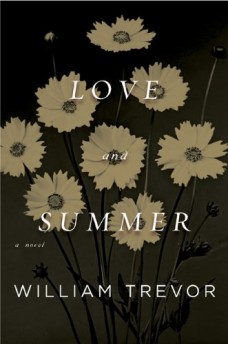 Reviewed:
Reviewed:
Love and Summer by William Trevor
Viking, 224 pp., $25.95
The media’s obsessive analysis of Barack Obama’s Nobel Peace Prize cut short the annual rite of puzzling over the winner of the Nobel Prize for Literature. I have nothing against the work of Herta Müller. Like Harold Bloom and James Wood, I haven’t read it. More disconcerting was the longer list of candidates for the Nobel maintained by the London bookmaker Ladbrokes. It’s not about who was on the list — from Amos Oz at 4-1 (last I checked) to William Gass at 100-1, there were dozens of worthy writers accounted for. It’s about who wasn’t among those dozens: William Trevor.
Trevor is 81 years old. He has written 18 novels. His Collected Stories, published in 1993, was widely seen as proof that he is, in the words of The New Yorker, “probably the greatest living writer of short stories in the English language.” He’s since published four more highly praised story collections. A discussion about prize-worthy living writers that includes Don DeLillo, Joyce Carol Oates and Bob Dylan — which this year’s Nobel discussion did — but does not prominently include Trevor is a misguided discussion indeed.
His latest is Love and Summer, a slender novel set in the fictional Irish town of Rathmoye in the middle of the 20th century. At its center is the relationship between Ellie Dillahan, an orphan who is married to a local farmer still devastated by the accidental death of his wife and child seven years earlier, and Florian Kilderry, a lonely, daydreamy young man preparing to leave Ireland for the first time — and for good. Florian has recently inherited an estate (and debt) from his deceased father. The estate is called Shelhanagh House, and it’s on its sprawling grounds that his gentle, secret meetings with Ellie occur.
Trevor’s earliest novels displayed a spirited, almost Waugh-like sense of humor, but that was a long time ago. Here, as in much of his recent work, he almost never calls on humor, and when it appears it does so with exceeding subtlety: “His dog sniffed about in the dust, before lying down to wait for something better to happen.” Trevor has methodically dried his novels out over time, and they are now almost totally sober affairs. Love and Summer might be the most meditative, least plot-driven of them, which is saying something.
Ellie and Florian’s affair lacks in fireworks. Not the most ignitable people, they are essentially kind souls held in check by “private doubts.” Florian recalls a gift of painting supplies on his fifth birthday:
Receiving the flat, black tin box he’d been given, he had imagined it contained sweets until he folded back the hinged lid and saw the colours. His mother read out the names: chrome yellow and Prussian blue, madder and crimson lake, cobalt and emerald. He got them muddled; they said that didn’t matter. ‘Oh, you can of course you can,’ they said when they dipped the brush in the water and gave it to him. They showed him how; he splashed and made a mess. ‘Of course you can,’ they said again. He knew he couldn’t.
Ellie is “[c]ontent but for her childlessness.” Her trips into town to deliver eggs from the farm constitute her social life. (She meets Florian, an amateur photographer, when he’s in Rathmoye looking for subjects.) The routines of both characters are quiet and plain, and Trevor presents them just that way. There are several sentences like these: “In the kitchen he put sausages on to fry.” And, “The saucepan lid rattled; she turned the heat down.”
But to understand the power of Trevor’s simplicity, we have to zoom out and see his approach before landing on a similarly unadorned sentence:
In the crab-apple orchard [Ellie] scattered grain and the hens came rushing to her. She hadn’t been aware that she didn’t love her husband. Love hadn’t come into it, had never begun in a way that was different from the love spoken of so softly by the nuns at Cloonhill, its brightly visible sign burning perpetually, as it did above the kitchen doorway in the farmhouse, as it had for the woman who once had scoured the saucepans that now were hers, and for other women before that. She closed the hens in and cut two lettuces on her way back to the yard. She picked the best of the chives.
In placing the profound against the banal, Trevor lightens one and deepens the other, making the profound something normal and approachable and the banal something charged by emotional significance. His romantic (if resigned), acceptably sentimental brand of minimalism brings to mind Virginia Woolf’s thoughts about a different sort of minimalist, Hemingway: “a few words . . . have a curious force,” Woolf wrote, and the “prevailing atmosphere is fine and sharp, like that of winter days when the boughs are bare against the sky.”
The affair in Love and Summer has one refreshing twist. One of its participants is more in love than the other. Trevor makes this as clear and heartbreaking as he has made so many other universal subjects. Even at just 212 pages, the book lingers a bit too long, some of its final, brief chapters becoming repetitively misty, but then perhaps Trevor has earned the right.
John Williams is the editor of The Second Pass.
Mentioned in this review:

